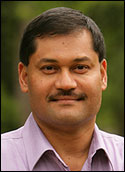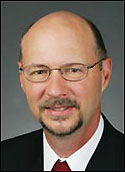Two faculty members at Vanderbilt University’s School of Engineering have been named fellows of the Institute of Electrical and Electronics Engineers (IEEE).
Gautam Biswas, professor of computer science and computer engineering, and Robert Reed, professor of electrical engineering, were announced this month as recipients of one of the association’s highest honors.
The grade of fellow is conferred by the IEEE Board of Directors upon a person with an outstanding record of accomplishments in any of the IEEE fields of interest. The total number selected in any one year cannot exceed one-tenth of one-percent of the total voting membership. IEEE Fellow is the highest grade of membership and is recognized by the technical community as a prestigious honor.

Biswas is being recognized for contributions to the modeling and simulation, diagnosis, and fault-adaptive control of complex dynamic systems.
Biswas’ work on fault diagnosis and fault-adaptive control has been applied to secondary sodium cooling systems for nuclear reactors for PNC, Japan, automobile engine coolant systems for HP Labs, fuel transfer systems for aircraft for Boeing PhantomWorks, Advanced Life Support systems and power distribution systems for NASA. He also has initiated new projects in health management of complex systems, which includes online algorithms for distributed monitoring, diagnosis, and prognosis.
More recently, he is working on data mining for diagnosis, and developing methods that combine model-based and data-driven approaches for diagnostic and prognostic reasoning. For this work, in conjunction with Honeywell Technical Center, Biswas recently received the NASA 2011 Aeronautics Research Mission Directorate Technology and Innovation Group Award for Vehicle Level Reasoning System and Data Mining methods to improve aircraft diagnostic and prognostic systems.
Biswas joined the engineering faculty in 1988. He has an undergraduate degree in electrical engineering from the Indian Institute of Technology (IIT) in Mumbai, India, and master’s and doctoral degrees in computer science from Michigan State University.

Reed is being recognized for contributions to understanding the effects of single-event particle radiation on integrated circuits.
Reed’s research interests are related to the physics of failure of electronic and photonic devices and integrated circuits when exposed to various radiation environments. In particular, he is interested the susceptibility of these components to single event effects and displacement damage dose.
As a specialist in the cross-disciplinary area of radiation transport physics and semiconductor device physics, Reed’s research has significantly impacted the development of techniques associated with assessing the performance of commercial and radiation-hardened integrated circuits when exposed to space, man-made, and terrestrial radiation environments.
Reed is a member of six NASA review boards and the recipient of numerous NASA performance and achievement awards. He was the technical program chairman for the 2011 IEEE Nuclear and Space Radiation Effects Conference, and he will serve as general chairman of NSREC in 2016.
Reed earned a bachelor’s, master’s and doctoral degrees in physics. His graduate degrees are from Clemson University. He joined the engineering faculty in 2004, and he is a faculty member in the School of Engineering’s Institute for Space and Defense Electronics.
The IEEE is the world’s leading professional association for advancing technology for humanity. Through its 400,000 members in 160 countries, the IEEE is a leading authority on a wide variety of areas ranging from aerospace systems, computers and telecommunications to biomedical engineering, electric power and consumer electronics. The IEEE publishes 30 percent of the world’s literature in the electrical and electronics engineering and computer science fields, and has developed more than 900 active industry standards. The association also sponsors or co-sponsors nearly 400 international technical conferences each year.